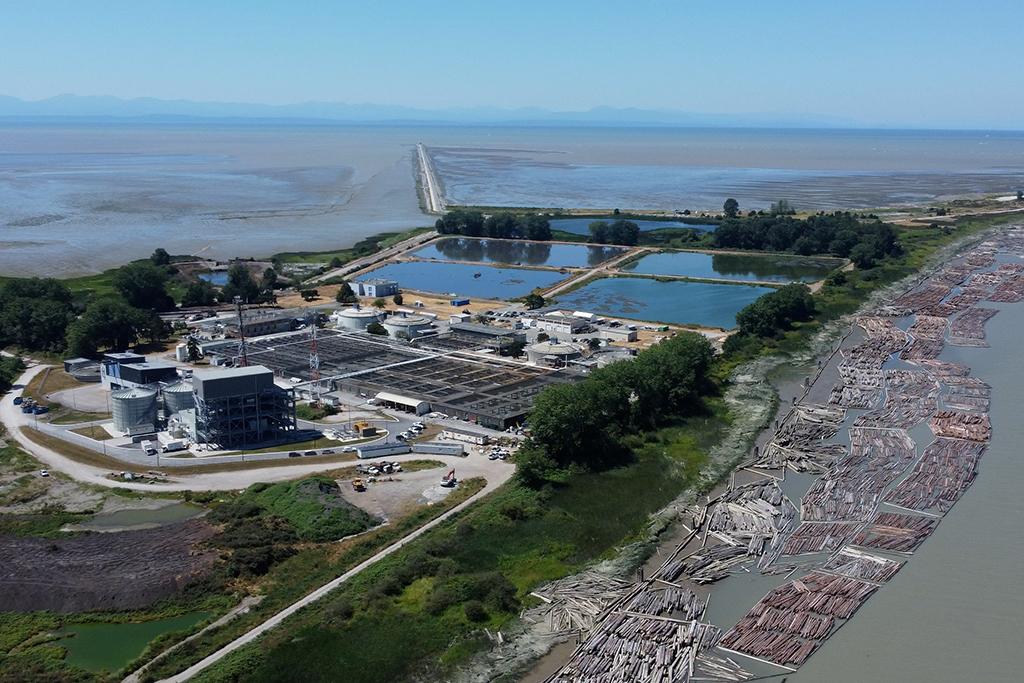Metro Vancouver, a federation of 21 municipalities in B.C.’s Lower Mainland, has proposed building an industrial barge berth at the mouth of the Fraser River that will be used as a staging area for an upgrade of the Iona Island wastewater treatment plant.
But nearby Vancouver residents are panning the barge berth plan for its possible impact on the area’s leafy environment.
Hundreds of people have signed an online petition to stop the berth from being built near Deering Island, a small island in the river, where there are about 30 residences and a park.
The City of Vancouver describes the park as “a semi-natural area perfect for enjoying the peaceful views of the river and tidal marshes.”
The petitioners say the island and adjacent areas on the north side of the Fraser will suffer long-term air, noise and sound pollution.
They prefer transporting the project’s building materials by trucks that would use roads in nearby Richmond to reach the project site, instead of barges on the river.
Metro owns and operates the plant, which serves approximately 750,000 residents in the Vancouver Sewerage Area (VSA).
The VSA covers a big area, receiving flows of wastewater from the west side of Vancouver and parts of the suburbs of Burnaby and Richmond.

Built in 1963, it is one of the last plants on the North American west coast to provide primary wastewater treatment only.
Metro says much of the existing plant is reaching the end of its service life and is vulnerable to both earthquakes and rising sea levels.
Plans include construction of a higher flood level, more resilient utilities and access and ground improvements to ensure the facility can still operate after a major earthquake.
Also in the works are ecological restoration projects at the plant and at adjacent Iona Beach Regional Park.
The treatment plant upgrade and the ecological restoration projects, which together make up Metro’s largest infrastructure project, will require the movement of large volumes of materials and many construction workers over some 15 years.
Because of its location, surrounded by water in the Fraser River delta, the site requires extensive ground improvements so that Metro can build a strong foundation for its operations.
Metro says transporting materials by barge will replace approximately 500 dump trucks per day, reduce greenhouse gas emissions and minimize costs and delays.
Winnie Shi, director of project delivery for Iona Wastewater Treatment Projects, says three sites are currently being considered for the location of the barge berth.
“Sites 1, 2 and 3 are currently being evaluated by a third party,” says Shi. “We hope to get a report in early 2024.”
The petitioners are almost 900 in number and are collectively known as the Fraser River Community Alliance.
Michael Geller is one of the petition’s signatories. He’s also the planner and development manager of Deering Island, and his family has lived on the island since construction was completed 30 years ago.
“While we favour the plant upgrade, we are not in favour of the
proposed barge terminals,” says Geller. “A marine terminal to bring in sand, aggregates, cement and building materials will add to the air pollution, through dust and diesel particulates, as well as contribute to noise and light pollution.”
The barge terminal will operate six days a week, 13 hours a day for 10 years.
In addition, says Geller, it will be within 200 yards of public trails and parks that are well used as well as residential neighbourhoods.
Furthermore, the proposed sites of the berth are at a pinch-point in the river where there is already busy commercial and personal recreational boat traffic.
“A barge location further to the west, where the river is wider, is preferred,” says Geller.
Moira Stilwell, a Deering Island resident and a founding member of the Fraser River Community Alliance, says people in the area “are coming alive to the issue.”
Recently, members of the alliance met with a representative of the nearby
Musqueam Indian Band to discuss what Stilwell calls “our many common interests in the north arm of the Fraser River.”
“There was lots of common interests and a lot of good signals about furthering working relationships,” says Stilwell.
Members of the alliance are looking for a common understanding with Metro on how to deliver and stage the construction materials that will have the least impact on health and safety, Stilwell says.
“We don’t have an alternative suggestion,” she says. “There’s no magical way to do this and it’s not going to be painless for anyone. We just want to spread the risks and the negative effects of the project as thinly as possible.”



As an elder of this community, it distresses me too. Understand why this project has been approved. Contact me with an explanation for this. I am ninety and unable to attend the meeting. Please send me an explanation.